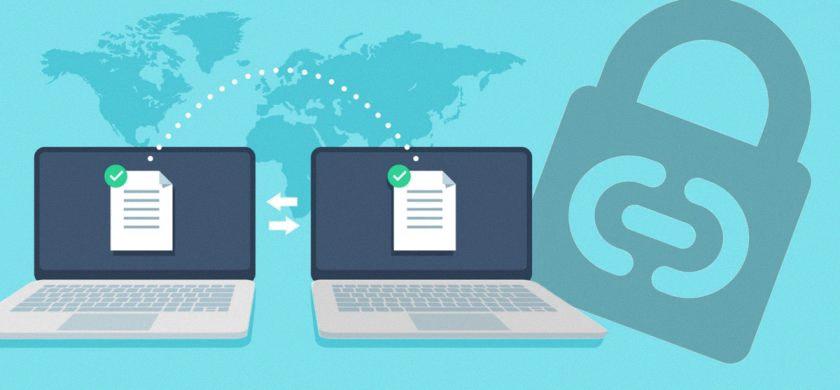When it comes to securely transfer files between systems, there are two main options: SFTP (Secure File Transfer Protocol) and SCP (Secure Copy). Both of these tools rely on Secure Shell (SSH) for the secure transfer of data, but the two protocols have different characteristics that make them suitable for different scenarios.
SFTP is a protocol designed for secure file transfers over an unsecured network. It uses authentication and encryption to ensure that the data transferred is not corrupted or intercepted by unauthorized parties. The authentication component of SFTP also allows users to choose their preferred mode of authentication as needed. Additionally, SFTP supports secure directory listings and file transfers, which makes it an ideal choice when transferring large amounts of sensitive data.
SCP, on the other hand, is best used for smaller transfers over high-latency networks such as WANs or VPNs. It doesn’t require authentication for each packet like SFTP does, which makes it faster than SFTP in these situations. However, because it doesn’t authenticate each packet, it is not as secure as SFTP since unauthorized access could be possible without proper security measures in place.
When it comes down to which protocol you should use for your specific situation, the answer ultimately depends on your security needs and bandwidth requirements. If you’re transferring large amounts of sensitive data over an unsecured network then SFTP would be a better choice due to its authentication and encryption components. On the other hand, if you’re dealing with smaller transfers over high latency networks then SCP might be a better option due to its increased speed compared to SFTP in such scenarios. Ultimately though, both protocols offer strong security when used properly with SSH enabled on both systems involved in the transfer process.

Source: kiteworks.com
The Difference Between SFTP and SCP
SFTP (Secure File Transfer Protocol) and SCP (secure copy) are two secure file-transfer protocols used to move files between systems securely. Both SFTP and SCP rely on the Secure Shell (SSH) protocol to transfer files, but they have some key differences.
SFTP is a more modern version of FTP (File Transfer Protocol), which allows for the transfer of files over a network in a secure manner. SFTP provides additional security by encrypting the data during transmission, as well as providing support for directory listings, file permissions, and even the ability to resume interrupted transfers. SFTP also supports multiple channels of data streams, allowing users to run multiple commands at once.
SCP is similar to SFTP in that it also relies on SSH for secure file transfers. However, it does not provide any additional features beyond those available with SSH. It is mainly used for transferring single files from one system to another, as well as uploading whole directories using recursive copying techniques. Unlike SFTP, it does not provide any additional features such as directory listings or resumed transfers.
both SFTP and SCP are secure protocols used for transferring files over a network in a secure manner. However, SFTP offers additional features that go beyond those available with SCP such as directory listings and resumed transfers; making it the preferred choice when transferring large numbers of files or working with complex directory structures.
Is SFTP Safer Than SCP?
The short answer to this question is that both SFTP and SCP offer roughly the same level of security when used with SSH. The only real difference between the two protocols is that SCP is faster for high-latency networks, as it does not require authentication for each packet sent and uses its own transfer algorithm. This speed advantage can come at the cost of extra bandwidth usage, however, as SCP does not compress data in transit as SFTP does.
When comparing the two protocols from a security perspective, both use SSH to encrypt communications between client and server, ensuring that all data transferred is secure. SFTP also supports other encryption methods such as TLS/SSL for additional protection. Both protocols also allow users to set up strong passwords or key-based authentication for added security.
In summary, while SFTP offers more flexibility than SCP in terms of encryption protocols and authentication methods, they both offer similar levels of security when used with SSH. The main difference between them is that SCP transfers data faster over high latency networks than SFTP, but with the cost of extra bandwidth usage due to lack of compression.
Comparing SCP, SFTP, and SSH
SCP and SFTP are both secure protocols used to transfer files over an SSH connection. SCP stands for Secure Copy, while SFTP stands for SSH File Transfer Protocol. Both protocols use the same underlying technology as SSH, or Secure Shell, which encrypts data being sent over the network.
SCP is a very basic protocol that allows you to copy files from one computer to another without any encryption or authentication. It’s fast and simple to use, but it doesn’t offer much in terms of security.
SFTP is an extension of SCP that adds authentication and encryption features to make it more secure. It uses public-key cryptography for authentication, and it encrypts data before sending it over the network. SFTP also supports directory listings and some other advanced features that aren’t available in SCP.
SSH is the underlying technology used by both protocols. It provides a secure channel between two computers, allowing them to communicate securely over an unsecured network connection. SSH uses public-key cryptography for authentication, and it encrypts data before sending it over the network as well.
The Benefits of Using SFTP
SFTP is still widely used because of its strong security and reliability. It helps protect sensitive data from interception by encrypting all data transferred between two computers over an insecure network. SFTP also provides authentication, ensuring that only authorized users can access the data. Additionally, it offers features like file transfer resume, directory synchronization, and advanced logging capabilities. By using SFTP, businesses can be sure that their data is safe and secure while also maintaining control over who has access to it.
Can SCP Be Used to Connect to an SFTP Server?
Yes, you can use SCP to connect to an SFTP server. SCP (Secure Copy Protocol) is a network protocol that allows the transfer of files between a local and remote computer or between two remote computers securely over an unsecured network. It uses SSH (Secure Shell) for authentication and encryption, which ensures that all data that is transferred is secure and confidential. To use SCP to connect to an SFTP server, you will need a client program such as WinSCP or PuTTY. Once connected, you can then transfer files quickly and securely using either the command-line interface or a graphical user interface.
What is SFTP in Plain Language?
SFTP stands for Secure File Transfer Protocol and is a secure way of transferring files between two computers. It is similar to the traditional FTP (File Transfer Protocol) but is much more secure. Instead of sending information such as passwords and files over an unencrypted connection, SFTP encrypts the data being sent. This makes it much harder for malicious third parties to access the data being transferred. To use SFTP, you must have an account with a server that supports SFTP and then you can transfer files between your computer and the server.
Can SFTP Be Vulnerable to Hacking?
Yes, SFTP can be hacked. Just like any other type of computer network, an SFTP server is vulnerable to malicious attacks from outside sources. Hackers can use a variety of methods to gain access to an SFTP server, including brute-force attacks, exploiting known vulnerabilities in the server software or operating system, and using malware or unauthorized accounts to gain access. It is important to secure your SFTP server by regularly patching any vulnerabilities and maintaining strong passwords and authentication protocols. Additionally, it is advisable to monitor your server for suspicious activity and take appropriate measures if any are identified.
Can SFTP Be Used Without SSH?
No, SFTP cannot exist without SSH. SFTP stands for Secure File Transfer Protocol and it is a secure method of transferring files over a network. It uses SSH (Secure Shell) protocol as the binding agent to transfer files securely. SSH is an encrypted protocol that ensures that the data being transferred is kept safe from unauthorized access or tampering. Without SSH, SFTP would not be able to protect the data being transferred, making it vulnerable to interception or manipulation. It is important to understand that while most SSH servers include SFTP capabilities, not all SFTP servers support SSH commands and actions.
Conclusion
In conclusion, SFTP and SCP are both secure protocols that can be used to transfer files between systems. Both rely on SSH for encryption, making them equally secure. However, SCP is generally faster than SFTP due to its own file transfer algorithm, making it a better choice in cases of high latency networks. Ultimately, the choice between SFTP and SCP depends on the user’s needs and preferences.








